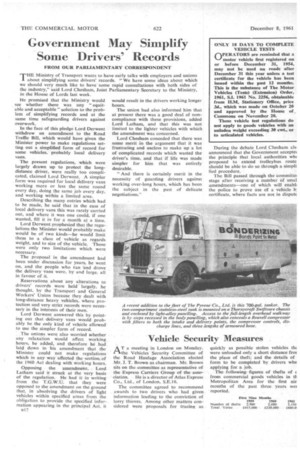Government May Simplify Some Drivers Records
Page 46

If you've noticed an error in this article please click here to report it so we can fix it.
FROM OUR PARLIAMENTARY CORRESPONDENT
THE Ministry of Transport wants to have early talks with employers and unions about simplifying some drivers' records. " We have some ideas about which we should very much like to have some rapid consultations with both sides of the industry," said Lord Chesham, Joint Parliamentary Secretary to the Ministry, in the House of Lords last week.
He promised that the Ministry would see whether there was any "equitable and acceptable" solution to the problem of simplifying records and at the same time safeguarding drivers against overwork.
In the face of this pledge Lord Derwent withdrew an amendment to the Road Traffic Bill, which would have given the Minister power to make regulations setting out a simplified form of record for some vehicles, probably local delivery vans.
The present regulations, which were largely drawn up to protect the longdistance driver, were really too complicated, claimed Lord Derwent. A simpler form was required for local delivery vans working more or less the same round every day, doing the same job every day, and working within a limited area.
Describing the many entries which had to be made, he said that in the case of local delivery vans this was rarely carried out, and where it was one could, if one wanted, fill it in for a month at a time.
Lord Dement prophesied that the regulations the Minister would probably make would be of two kinds—he would limit them to a class of vehicle as regards weight, and to size of the vehicle. Those were only two limitations which were necessary.
The proposal in the amendment had been under discussion for years, he went on, and the people who ran and drove the delivery vans were, by and large. all in favour of it.
Reservations about any alterations to drivers' records were held largely, he thought, by the Transport and General Workers' Union because they dealt with long-distance heavy vehicles, where protection and very strict records were necessary in the interests of their men.
Lord Derwent answered this by pointing out that delivery vans 'would probably be the only kind of vehicle allowed to use the simpler form of record.
The unions were also worried whether any relaxation would affect working hours, be added, and therefore he had laid down in his amendment that the Minister could not make regulations which in any way affected the section, of the 1960 Act dealing with working hours. Opposing the amendment. Lord Latham said it struck at the very basis of the regulation. He had it in writing from the T.G.W.U. that they were opposed to the amendment on the ground that, in absolving the drivers of light vehicles within specified areas from the obligation to provide the specified information appearing in the principal Act, it a 1 2 would result in the drivers working longer hours.
The union had also informed him that at present there was a good deal of noncompliance with these provisions, added Lord Latham, and that this was riot limited to the lighter vehicles with which the amendment was concerned.
Lord Chesham conceded that there was some merit in the argument that it was frustrating and useless to make up a lot of complicated records which wasted the driver's time, and that if life was made simpler for him that was entirely desirable.
"And there is certainly merit in the necessity of guarding drivers against working over-long hours, which has been the subject in the past of delicate negotiations.
During the debate Lord Chesham alsi announced that the Government acceptet the principle that local authorities wh( proposed to extend trolleybus route should be able to do so through a simpli fled procedure. The Bill passed through the committei stage after receiving a number of smal amendments—one of which will enabli the police to prove use of a vehicle b: certificate, where facts are not in dispute




































































































































